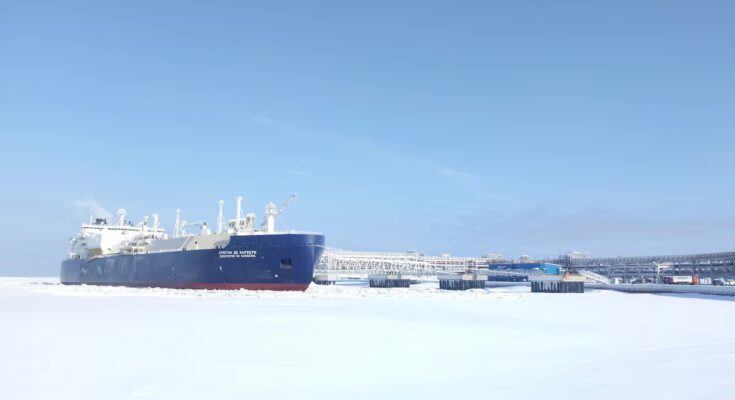In its fight against Russia’s war machine against Ukraine, the EU has begun to take action against coal. Shortly afterwards he lashed out against oil. Subsequently, the idea of harming the Moscow economy, tremendously dependent on the export of hydrocarbons, was to veto natural gas, from which Europe was trying to disengage itself after many years of dependence. But the situation remained there: the political will to expand actions in the energy sector was lacking. A major supply crisis was also feared, perhaps more than it should be: although expensive, liquefied natural gas (LNG, transported by ship) proved to be a much more robust solution than previously thought. And Hungary and Slovakia’s persistent block on a decision that should be taken unanimously has become insurmountable for months.
The European Commission then presented RePowerEU, a plan that was essentially a way to circumvent the unanimity requirement, as it was a purely commercial measure. But some capitals, especially those most linked to Russian gas, have warned of the great risk of disputes; especially in the case of long-term agreements.
Reluctance also came from companies: the French TotalEnergies, the Anglo-Dutch Shell and the Spanish Naturgy have signed risky contracts for the supply of Russian gas of the type take or paywhich require payment regardless of whether fuel is consumed or not. This is, today, the last loose end to realize the desire to stop buying gas molecules from Russia. The end seems closer than ever, but it won’t be easy.
“The EU needs a proper legal basis, which it doesn’t have yet; it will almost certainly end in arbitration,” warns Mike Fulwood, senior research fellow at the University of Oxford’s Institute of Energy Studies, by email.
Along the same lines, Francesco Sassi, a professor at the University of Oslo specializing in energy issues, recalls that “although the EU has significantly reduced its dependence, in 2024 supplies of Russian origin continued to occupy third place in terms of volume: only Norway and the United States exported more gas to the EU”. The academic and former consultant focuses above all on the “concern” of European companies: “Russian companies that currently export gas to the EU under long-term contracts (take or pay) will not hesitate to claim considerable sums in lengthy arbitration proceedings,” he predicts.
To achieve the ultimate goal of disconnection, community institutions have moved towards a sanctioning scheme in which companies can invoke “force majeure” to terminate these agreements, which do not have the Russian state as a counterparty but rather Yamal LNG, a private consortium led by the local energy company Novatek (50.1% of the capital) and in whose capital TotalEnergies itself (20%), the Chinese CNPC (20%) and the Silk Road Fund also participate. (9.9%), also Chinese-owned. Yamal LNG, which exploits Siberia’s vast gas resources, is the source of virtually all LNG shipments that continue to arrive at the community’s ports.
The Community Executive currently believes that the risk of litigation is low. That, in short, there will be no possible international arbitration with the Eurasian country. The move to sanctions has reassured even the most worried countries in Central and Eastern Europe. They now feel they have an answer to their question about legal risk.
Russia, however, has already promised retaliation for the approval of the nineteenth sanctions package, which with the inclusion of Russian liquefied gas and the veto for January 2027 makes a big leap in quality in the fight against the Kremlin’s war machine, still fueled by the sale of energy. “It’s time to turn off the tap,” underlined the President of the European Commission, Ursula von der Leyen. Finally, Brussels seems convinced that it can achieve this objective without major headaches in the capitals and in the private sector, more confident that the protections offered by the Community Executive will be sufficient.
One fifth of liquefied gas
Last year the Twenty-Seven imported 20 billion cubic meters of Russian gas, almost entirely by ship: at this point, only one gas pipeline (the Turkstream) transports fuel between the Eurasian country and the Union. However, according to Brussels estimates, in 2014 Moscow still contributed 20% of all European LNG imports. With these sales, Russia earned around 6 billion euros in exchange, succulent revenues that it will no longer receive with the entry into force of sanctions.
“Disconnecting from Russian gas earlier would have had a significant impact on the price: by doing so, the risk was mitigated by the surge of (available) LNG and, also, new supply arriving across the Black Sea, via Turkey and Romania,” concludes Fulwood.
Unlike what happened at the dawn of the invasion of Ukraine, in the midst of the energy crisis, the EU now has solid alternative gas suppliers. Norway, the most reliable of all, does not stop winning in numbers: without its help, the Twenty-Seven would have had a really bad time in 2022 and 2023. The United States has concentrated much of its new liquefaction infrastructure on sales to Europe, and the pressure from the American Donald Trump was decisive in getting Brussels’ plan against Russian LNG off the ground, a high-ranking EU source acknowledges. Qatar has signed long-term agreements (beyond 2050, which is said to be soon) to supply its gas to France or the Netherlands. And Algeria, in addition to covering a large part of current and future Spanish consumption, has taken another step to sell large volumes to Italy.
Three-way negotiation
The Commission is now negotiating in three parts the final details of the plan to phase out Russian gas. The European Parliament is pushing for an even more rigid approach and to further accelerate the ban, which could deny the Kremlin another 29 billion between 2026 and 2028. And the debate between member states continues in the Council. Some, such as Poland, Sweden or Croatia, support this accelerated veto. Others, such as France, Spain and Belgium – large importers of Russian LNG: the majority of Siberian shipments arrive in these three countries today, simply because they have the regasification facilities needed to process it – are demanding even stronger guarantees against possible trade lawsuits after the end of long-term contracts.
Among potentially affected European energy companies, the case of TotalEnergies is particularly shocking. In addition to having the contract take or pay larger and longer, with an expected completion date of 2041 (three years after Naturgy), the French company is also a shareholder of Yamal LNG. A participation that earned him important dividends, even almost four years after the start of the great Russian invasion.


